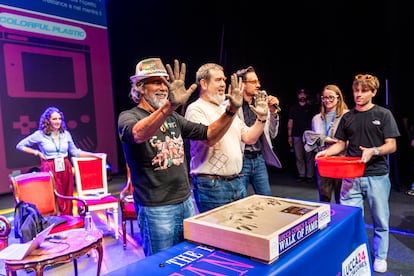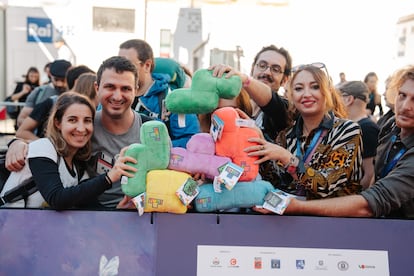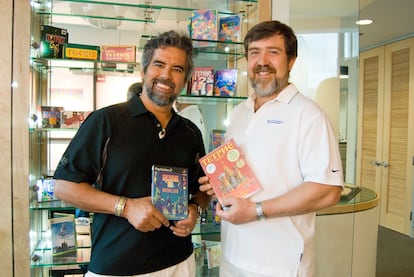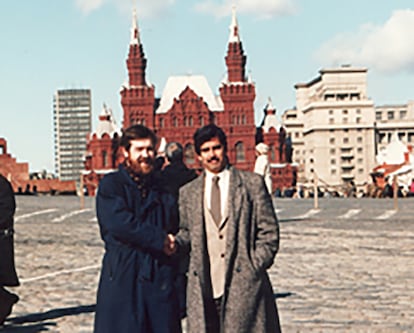One invented a video game in his free time that has sold more than 520 million units. The other fought to obtain the rights in the middle of the Soviet Union, removed the designer from there and made it easier for half of humanity to dream of blocks falling at the same time as the Berlin Wall collapsed.
Alexey Pajitnov (Moscow, 1955) and Henk Rogers (Amsterdam, 1953) are partners in The Tetris Company, which this year celebrated the game’s 40th anniversary, but they are much more than that. Together in Moscow at the end of the eighties they lived a crazy adventure to wrest the distribution license for Tetris from both the jaws of the hermetic Soviet bureaucracy and savage capitalism (Mirrorsoft, owned by media magnate Robert Maxwell, who ended up in jail for a fraud, was distributing Tetris without a fully valid contract). The bizarre story inspired the entertaining thriller Tetris (2023, Apple TV+) and forged a complicity that is evident in every gesture of the interview.
Ask. How do you define your relationship?
Alexey Pajitnov. It’s his favorite topic, let him answer…
Hank Rogers. We are friends, although we couldn’t be more different, Alexey likes classical music, I like rock. To him to plan, to me the adventure. He is an introvert. I am an extrovert… But if we are in the same city, a bottle of wine falls.
A.P. It’s weird, this guy is part of my life.
P. What made you connect and trust each other?
A.P. We met in Moscow in 1989 at a negotiation table (at the offices of Elorg, a state-owned software export company). I was the only video game designer in the USSR, so Henk was the first colleague I ever saw.
H.R. That doesn’t explain how we became friends! Okay, I was your first girlfriend, but that’s why we’re not still together (both laugh). I think the key to earning their trust (and that of everyone there) was my complete honesty about how the business works. My speech disarmed them.
A.P. It was a shock. In the eighties in the Soviet Union where every capitalist was an enemy…
P. And what did Henk see in Alexey to risk everything, including mortgaging his house, for him.
H.R. First: the simple genius of what he had created. And then his perseverance. He endured an incredible amount of shit to get his game forward in a USSR that did not understand copyright or patents. In 1984 he entered a contest just so it could be written that Tetris was his. He came second (laughs).
P. When they realized they had something iconic on their hands.
A.P. I was still working on the prototype, I had the playing field, the generator, the pieces falling, but there was still no decoration, no point marker… I had been working on it for three weeks when I caught myself playing with the excuse of that I was fixing a bug. But there was no failure, I just couldn’t stop playing.
H.R. I always believed that the game would be a big hit, but when we started moving it around Japan I only got orders for about 40,000 units. I needed to place at least 200,000. Then I made an appointment with Mr. Yamauchi, president of Nintendo. “I have the best game of all time but I can’t sell it, am I terrible at marketing? What is my problem?” He called Mr. Miyamoto, creator of Mario, to try it out and asked him if the game was any good. “Yes,” Miyamoto said. “Why?” Yamauchi replied. “All the secretaries and accountants are playing it at lunchtime and that has never happened to us.”
P. Yaumachi gave the game a financial boost, but the real success came when they released it alongside the new Game Boy portable console. In the film Henk is key in that decision…
H.R. Yes, the literal phrase that I told them at Nintendo appears in the film: “If you want to sell the Game Boy to children, package it with Mario; If you want to sell it to everyone, do it with Tetris.”
P. What did you think of the movie?
A.P. Surprisingly good. We were very involved in the script phase, we made many changes, but we did not have any control in the filming due to covid and we were worried. But it’s very good, although it’s rare to see someone who looks like you interpreting your life.
H.R. I was terrified but in the end I cried several times when I saw her with things that never happened!

P. The film ends when Alexey leaves the USSR and Henk is waiting for him at the San Francisco airport. What would happen in the sequel?
H.R. In short, after several complications Alexey started charging for Tetris in 1995. In the early 2000s I started a mobile game company —I knew they were going to hit hard. The video game publisher Jamdat offered me $25,000 to license Tetris. I told them bullshit, and a couple of years later when they went public, they bought my company for over $67 million. A month after the sale, when he had not yet touched the money, he was in an ambulance on the way to the hospital with a complete blockage of his coronary artery. A heart attack known as widowmaker (because it is the one that leaves the most widows). 95% of those who suffer from it die, but I survived and found a mission: ending fossil fuels. People think we’re screwed, I say we need to make a decision and fix the problem.
A.P. When the movie ends, I continue. I had a pretty good career at Microsoft as a designer. I was at the beginning of the Xbox, there were a lot of problems, I published five or six games… I’m proud. And now, well, almost retired. I have several projects, but they are going slowly… And I am still having a good time.
H.R. And you’ve written a novel!
A.P. Yes, it’s about a gang of young delinquents in the former Soviet Union, my favorite archetype.
H.R. I am also writing a book, about what happened before and after the events narrated in the film. It is titled The perfect game, from Russia with lovewill be out in April.
P. Is there something bittersweet about being remembered for just one thing or is that enough?
A.P. It’s worth it to me. At some point in my career I felt that having made Tetris limited my designs, that I needed to overcome it… But now I’m at peace.
H.R. I don’t feel like Tetris defines me. Now I fight for climate change and in that world I am gaining notoriety. I live in Hawaii where I work for 100% renewable energy. Tetris is not my last bell.

P. How much has the industry changed? Could a case like yours occur today in which something that starts so small conquers the world?
A.P. Unfortunately now everything moves very fast and the developers are not precise or careful, there is so much competition that a lot of garbage is produced. It’s a shame, but also with such a large number of titles, from time to time one appears that changes the industry.
H.R. I think it happens all the time. Look Minecraft, a game that is unlike any other and started as something small and boom boom boom, it became huge. And well, I also like a very silly little game called Wordle…
P. To you and many other millions of people. It’s true that a guy created it in his house during confinement…
H.R. And although it is based on other games, such as Mastermindit is a very pure. I play it with a group of brothers and friends, the same ones who play the (board game) Catan. We accumulate points Wordle weekly and whoever wins can add a new rule to the Catan.
P. Wow, he’s quite the player.
H.R. Definitely.
P. And you Alexey?
A.P. I do a lot of puzzles. I’m more of a mathematician, I like puzzles, finding the mystery behind numbers and things like that.
P. And do you still play tennis? (Tetris is a combination of tetra, four in Greek, the number of squares that make up the pieces, and tennis, the designer’s favorite sport).
A.P. I’m too old, don’t even remind me.
P. And Tetris?
A.P. Sometimes for fun.
H.R. Only if I have to try something for work.

P. What if they play together?
A. Q. He is more aggressive. And much better.
P. What do you think of other video games, for example, Super Mario.
H.R. Great game. I have played it until the end.
A.P. It’s not my type, but I’ve played it a lot.
P. ¿Candy Crush?
A.P. It is a copy of Bejeweledwhich in turn, was based on a prototype called Breakthrough…
H.R. Come on, some poor fool made the original and never made anything because there is a copy of a copy of a copy…
A.P. The what Bejeweled It pissed me off so much that I made my own version. It was a great idea carried out in a very careless manner. A filthy job. My version, Hexic, was a good game, I still get royalties for it. About 35 dollars a month (laughs).
P. ¿Minecraft?
A.P. Incredibly interesting. A phenomenon in the industry. I’ve spent months playing.
H.R. It’s gold.
P. The survival game Fortnite?
A.P. I don’t know him.
H.R. Me neither, but when I started designing games I made a decision, to never make a game that I didn’t want my children to play. A very simple rule.
P. Do you feel guilty for the time you have wasted with Tetris?
H. R. Tetris involves a series of decisions every few seconds, while in life you do many things automatically, you get up, have breakfast, go to work… Just as I wouldn’t feel guilty about running on a treadmill to improve your performance. Cheers, I don’t feel guilty about exercising your mind.
A.P. That time you wasted… did you have a good time or a bad time? If you had a good time, rather than stealing it from you, I gave it to you.

